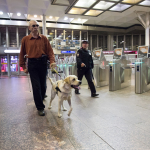Indoor Navigation Apps Required to Give Blind or Visually Impaired Full Independence While Traveling
BOSTON–(BUSINESS WIRE)–Strategy Analytics – Being able to travel independently is vital to the wellbeing of the sight loss community. But navigating alone around indoor places such as malls, train stations and airports, is difficult unless the individual is very familiar with their surroundings. While meet and assist services exist in train stations and airports, they typically must be booked well in advance and do not provide satisfactory user experiences. There is huge opportunity for technological innovation to combat the issues of navigating indoor spaces for the blind or visually impaired.


Research conducted by Strategy Analytics explores the needs of people who are blind or visually impaired and their relationship with technology. A new series of reports from the User Experience Strategies service at Strategy Analytics, identifies key design implications with respect to user needs, technology use and pain-points for the sight loss community while travelling, using smartphones, or when using smart home technologies and appliances.
Commented Lisa Cooper, report author and Director, UX Innovation Practice, “There is an overwhelming opportunity for technological innovation to help people with sight loss navigate indoor public spaces when traveling. This would fill a huge need and eliminate a huge source of anxiety that was identified by the participants in our research when trying to navigate indoor places such as airports, bus and train stations, and shopping malls.”
Continued Cooper, “A trusted app – similar to a turn-by-turn navigation app commonly found for outdoor spaces – would be a game changer. Not only could a blind or visually impaired person use this kind of app to plan ahead of their journey, they would also be able to use it while they are physically navigating the indoor public space.”
Commented Kevin Nolan, VP, UX Innovation Practice, “The use of other modalities such as braille and haptic feedback, rather than relying solely on audio feedback to visualize maps and scheduling, is key to helping this community better learn how to plan trips and understand their surroundings. If indoor navigation could be made available and linked to the identification of trains, buses and gate information, people with sight loss would be able to independently know where they are going, catch the right train or plane, or even navigate on foot to a specific store in a mall.”
About Strategy Analytics
Strategy Analytics, Inc. is a global leader in supporting companies across their planning lifecycle through a range of customized market research solutions. Our multi-discipline capabilities include: industry research advisory services, customer insights, user experience design and innovation expertise, mobile consumer on-device tracking and business-to-business consulting competencies. With domain expertise in: smart devices, connected cars, intelligent home, service providers, IoT, strategic components and media, Strategy Analytics can develop a solution to meet your specific planning need. For more information, visit us at www.strategyanalytics.com.
Source: Strategy Analytics, Inc.
#SA_UX
For more information about Strategy Analytics
Service Name: User Experience Strategies
Service Name: In-Vehicle UX
Service Name: UX Innovation Practice
Contacts
Report contacts:
European Contact: Diane O’Neill, +44 (0)1908 423 669, doneill@strategyanalytics.com
US Contact: Lisa Cooper, +1 617 614 0711, lcooper@strategyanalytics.com




